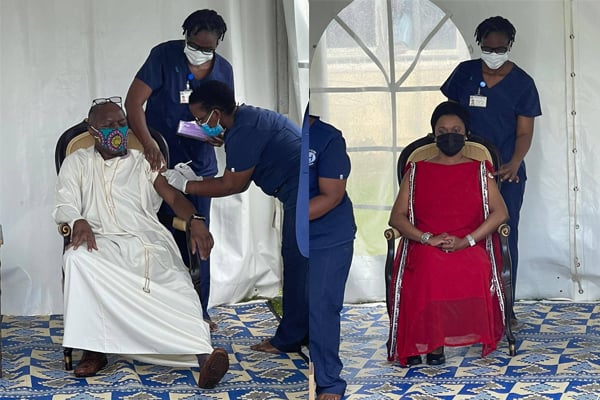Target fence-sitters to increase vaccine uptake

Photos circulated on different social media platforms by kingdom officials on Friday morning showed the king and his queen being vaccinated
What you need to know:
- Our view: Government must be honest and emphasise to the public that the benefits of the vaccine outweigh the side effects.
The government plans to vaccinate at least 5.5 million Ugandans who are at increased risk of severe illness from coronavirus. Regrettably, fence-sitters have increased to the extent that even older persons with underlying medical conditions that increase the risk of dying from the deadly coronavirus disease are watching from the sidelines.
Uganda received 964,000 doses of AstraZeneca vaccine through a global vaccine sharing initiative, Covax facility, and India but only 206,708 Ugandans have received their first jabs. This is about 21 per cent of the available doses used, 35 days after the launch of the drive.
The government needs to wake up and probe why some Ugandans are sitting on the fence. Convincing fence-sitters is crucial to this life or death battle against the pandemic. Otherwise, ignoring laxity at play in the midst of rising cases of new variants as well as infections, may have devastating effects on our country.
Some doses may even expire before they are used depending on when they were manufactured as it happened in Malawi last week. The shelf life of the AstraZeneca Covid-19 vaccine is six months, according to information from the manufacturer. Let’s address the gaps before it’s too late.
Government should urgently address serious cracks in sensitisation of the public, increase the number of vaccination points and ensure consistency at designated facilities. This will increase uptake and curtail vaccine hesitancy in the country.
The uptake has remained low and many people who want to be vaccinated don’t know where to get the jabs. Ministry of Health has released the list of 689 vaccination points that were dominated by public health facilities and members of the public say they don’t know where to get the jabs.
But, the fact that most Ugandans (close to 80 per cent) seek medical care from private health facilities, means that making the facilities to administer jabs will increase uptake among their clients.
The ministry should also be open to the reality that there are conspiracy theorists who have made a mountain out of a molehill as far as the side-effects are concerned. As foreign regulators have maintained, the government must be honest and emphasise to the public that the benefits of the vaccine outweigh the side effects.
The government should consider diversifying vaccine options for the population like Rwanda did to increase uptake. Rwanda also used Pfizer vaccines.
Many vaccines have been listed for emergency use by World Health Organisation and allowing eligible private players to bring in the vaccines from reliable manufacturers will boost the uptake and address hesitancy.




